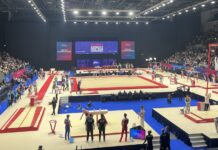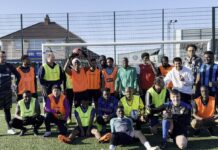St Helen’s Women’s rugby winger Leah Burke has become the most recent female athlete to suffer an anterior cruciate ligament rupture, a cruel injury that is becoming more common and occurring at an alarming rate amongst female athletes, more so than in men.
An anterior Cruciate Ligament is one of the key ligaments that helps stabilize the knee joint. It connects the thigh bone (femur) to the shin bone (tibia).
An ACL tear is when the ligament either has a slight tear or a complete snap (rupture) which disconnects the thigh bone and shin bone causing the knee to de stabilise and therefore effecting the range of movement.
An ACL injury is one of the most severe and long-term sporting injuries. It has become increasingly more common in women’s sport with cases rising every year.
Orthopaedic surgeon Mike Grant specialises in ACL trauma and is a former medic for rugby league sides Widnes Vikings and the Leeds Rhinos.
He thinks the pressure and demand of modern sport is playing a part in the spike in injuries in females.
He explained: “Players now are so much fitter and stronger in modern sport, and the demand they put on their bodies week-in week-out is playing a huge factor.
“I think that players at the top level are conditioned to deal with anything, so it’s mostly bad luck with ACL injuries, but if you’ve played a lot of games in a number of weeks, you’ll be fatigued which is playing an issue.”
More is being done to protect young athletes, including education on conditioning and preparation from an early age.
Grant added: “There’s now Power Up To Play, which has been set up to help adolescents prepare for sport, it’s helping them make their warmups and conditioning more dynamic, it wont completely prevent ACL injuries because they’re mostly bad luck, but it will bring down the numbers with younger athletes knowing how to condition properly.”
View this post on Instagram
Grant explained that the structure behind some women’s sport is still developing, when compared with more established men’s competitions and that is also a contributing factor.
He said: “We’ve seen a massive increase in participation in women’s sport which is fantastic, but the infrastructure behind women’s sport… there seems to be a slight lag compared to men’s sport. The amount of input they’d get from medical and physio departments is less, and even the input they get from training at a young age is less.”
Studies carried out by by the British Orthopaedic association revealed women are three to six times more of a chance of suffering a serious knee injury in sport.
Grant explained the science behind it, explaining: “The biology is different, the difference in the shape and build of a female leg does play a role, the difference in muscular make-up around the knee for a female does also play a role. Lots of the female athletes now are conditioned just as well as any male athlete, but there’s still the inherent risk of knee injuries especially in younger female athletes.”
Research is being carried out by surgeons in Australia into the rehabilitation of an ACL injury to see if it can heal effectively without surgery. That could cut the number of athletes going under the knife with a longer recovery time.
Surgery makes recovery time longer, and Grant commented: “We know that the ACL forms scar tissue because it bleeds when it’s injured, and the theory is if you position the knee in a specific way then the ACL scars over it’ll heal in its native position.”
The risk of an ACL injury can never be completely erased but with the initiatives like Power to Play, the improved education on preparation and conditioning for younger female athletes could bring the numbers down.















